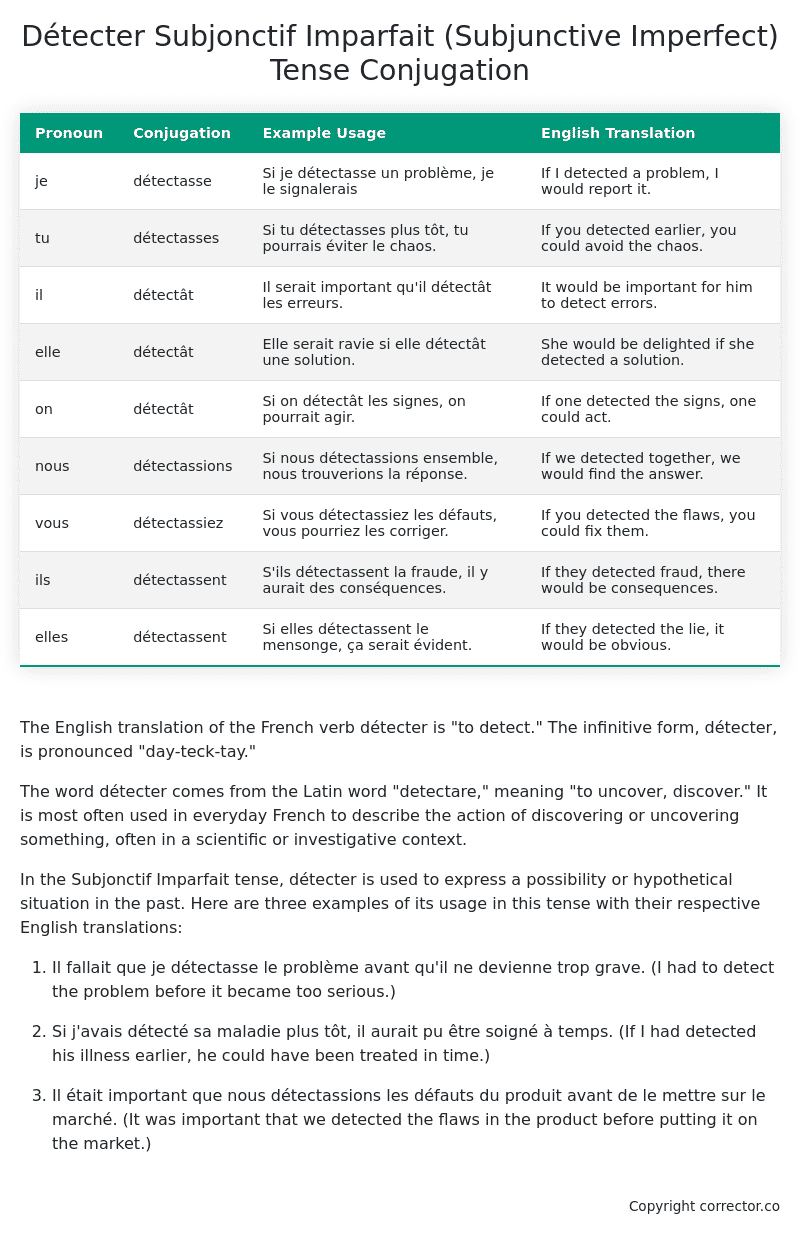Subjonctif Imparfait (Subjunctive Imperfect) Tense Conjugation of the French Verb détecter
Introduction to the verb détecter
The English translation of the French verb détecter is “to detect.” The infinitive form, détecter, is pronounced “day-teck-tay.”
The word détecter comes from the Latin word “detectare,” meaning “to uncover, discover.” It is most often used in everyday French to describe the action of discovering or uncovering something, often in a scientific or investigative context.
In the Subjonctif Imparfait tense, détecter is used to express a possibility or hypothetical situation in the past. Here are three examples of its usage in this tense with their respective English translations:
-
Il fallait que je détectasse le problème avant qu’il ne devienne trop grave. (I had to detect the problem before it became too serious.)
-
Si j’avais détecté sa maladie plus tôt, il aurait pu être soigné à temps. (If I had detected his illness earlier, he could have been treated in time.)
-
Il était important que nous détectassions les défauts du produit avant de le mettre sur le marché. (It was important that we detected the flaws in the product before putting it on the market.)
Table of the Subjonctif Imparfait (Subjunctive Imperfect) Tense Conjugation of détecter
| Pronoun | Conjugation | Example Usage | English Translation |
|---|---|---|---|
| je | détectasse | Si je détectasse un problème, je le signalerais | If I detected a problem, I would report it. |
| tu | détectasses | Si tu détectasses plus tôt, tu pourrais éviter le chaos. | If you detected earlier, you could avoid the chaos. |
| il | détectât | Il serait important qu’il détectât les erreurs. | It would be important for him to detect errors. |
| elle | détectât | Elle serait ravie si elle détectât une solution. | She would be delighted if she detected a solution. |
| on | détectât | Si on détectât les signes, on pourrait agir. | If one detected the signs, one could act. |
| nous | détectassions | Si nous détectassions ensemble, nous trouverions la réponse. | If we detected together, we would find the answer. |
| vous | détectassiez | Si vous détectassiez les défauts, vous pourriez les corriger. | If you detected the flaws, you could fix them. |
| ils | détectassent | S’ils détectassent la fraude, il y aurait des conséquences. | If they detected fraud, there would be consequences. |
| elles | détectassent | Si elles détectassent le mensonge, ça serait évident. | If they detected the lie, it would be obvious. |
Other Conjugations for Détecter.
Le Present (Present Tense) Conjugation of the French Verb détecter
Imparfait (Imperfect) Tense Conjugation of the French Verb détecter
Passé Simple (Simple Past) Tense Conjugation of the French Verb détecter
Passé Composé (Present Perfect) Tense Conjugation of the French Verb détecter
Futur Simple (Simple Future) Tense Conjugation of the French Verb détecter
Futur Proche (Near Future) Tense Conjugation of the French Verb détecter
Plus-que-parfait (Pluperfect) Tense Conjugation of the French Verb détecter
Passé Antérieur (Past Anterior) Tense Conjugation of the French Verb détecter
Futur Antérieur (Future Anterior) Tense Conjugation of the French Verb détecter
Subjonctif Présent (Subjunctive Present) Tense Conjugation of the French Verb détecter
Subjonctif Passé (Subjunctive Past) Tense Conjugation of the French Verb détecter
Subjonctif Imparfait (Subjunctive Imperfect) Tense Conjugation of the French Verb détecter (this article)
Subjonctif Plus-que-parfait (Subjunctive Pluperfect) Tense Conjugation of the French Verb détecter
Conditionnel Présent (Conditional Present) Tense Conjugation of the French Verb détecter
Conditionnel Passé (Conditional Past) Tense Conjugation of the French Verb détecter
L’impératif Présent (Imperative Present) Tense Conjugation of the French Verb détecter
L’infinitif Présent (Infinitive Present) Tense Conjugation of the French Verb détecter
Struggling with French verbs or the language in general? Why not use our free French Grammar Checker – no registration required!
Get a FREE Download Study Sheet of this Conjugation 🔥
Simply right click the image below, click “save image” and get your free reference for the détecter Subjonctif Imparfait tense conjugation!

Détecter – About the French Subjonctif Imparfait (Subjunctive Imperfect) Tense
Formation
Common Everyday Usage Patterns
Interactions with Other Tenses
Subjonctif Présent
Indicatif Passé Composé
Conditional
Conditional Perfect
Summary
I hope you enjoyed this article on the verb détecter. Still in a learning mood? Check out another TOTALLY random French verb conjugation!


